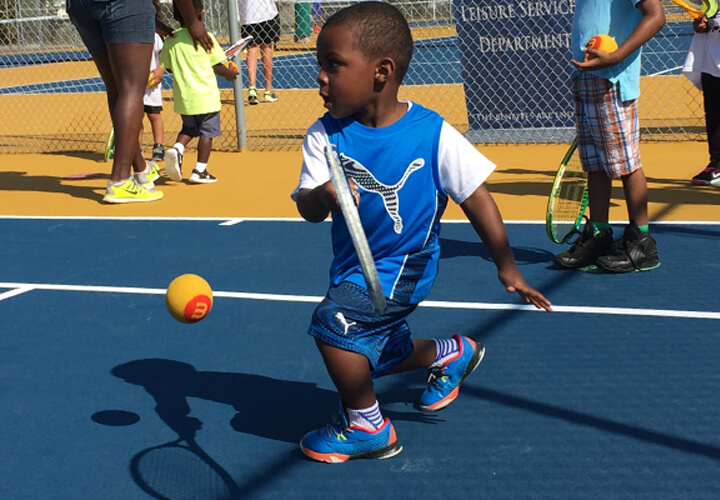Tennis is one of the best ways for children to become healthy, confident and physically fit. The very nature of the game of serving, returning and rallying makes tennis a highly active kids sport with plenty of movement, starts, stops and direction changes. As such, tennis is a great cardiovascular activity, and the movements used on the court help develop enhanced balance, agility and coordination. Mental focus is also sharpened through tennis because decision-making and concentration are necessary every time a ball is hit.
Regular tennis play has been demonstrated to improve, work ethic, because improvement through lessons or practice reinforces the value of hard work. Discipline, since you learn to work on your skills in practice and control the pace of play in competition. Mistake management, by learning to play within your abilities and realizing that managing and minimizing mistakes in tennis or life is critical. Accept responsibility, because only you can prepare to compete by practicing skills, checking your equipment and during match play by making line calls.
Cardiovascular, constant movement and swings, with full body and aerobic involvement. Balance, agility, coordination; quick direction changes, footwork, strokes and rallying improve eye-hand coordination and overall athletic agility. Mental focus, on the run decision-making and concentration on game play sharpen mental clarity and agility. Strength building, vigorous tennis game play builds both upper and lower body strength.
The psychological benefits from regular tennis play may help children to learn and develop positive
personality characteristics which are useful on the tennis court, but more importantly, are essential
for many everyday situations through life. Regular tennis play has been demonstrated to improve:
Work ethic because improvement through lessons or practice reinforces the value of hard
work. Discipline since you learn to work on your skills in practice and control the pace of play in
competition. Mistake management by learning to play within your abilities and realizing that managing
and minimizing mistakes in tennis or life is critical. One-on-one competition because the ability to compete and fight trains you in the ups and downs of a competitive world. Accept responsibility because only you can prepare to compete by practicing skills, checking your equipment and during match play by making line calls. Management of adversity, by learning to adjust to the elements (e.g. wind, sun) and still be able to compete
Tennis is, without doubt, good for the mind and body. Playing tennis regularly has many physical
and psychological health benefits associated with it.


Good Job 😉
Thank You!
I am so grateful for your article.Really thank you! Cool. Marcus Lovitz
Thanks for the post.Much thanks again. Really Great. Hong Figueroa
Wow! This could be one particular of the most beneficial blogs We have ever arrive across on this subject. Basically Excellent. I am also an expert in this topic so I can understand your hard work. Shanda Deck
Looking forward to reading more. Great article post.Thanks Again. Fantastic. Katharyn Offer
You have a quality site, I congratulate you on this
I like a very useful article, I like our page and follow it
You produce quality content, I appreciate you
Awesome article post.Much thanks again.
I love surfing on your pleasant site
You produce quality content, I appreciate you
It is a very good useful article I like to read such articles
I love surfing on your pleasant site
If you are going for best contents like I do, only go to see this web page all the time because it presents feature contents, thanks